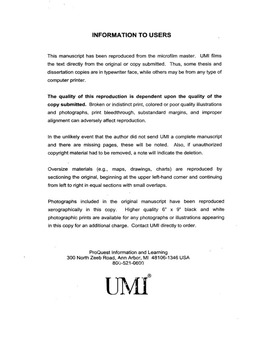| dc.contributor.advisor | Noley, Grayson, | en_US |
| dc.contributor.author | Lin, Shih-chung. | en_US |
| dc.date.accessioned | 2013-08-16T12:18:19Z | |
| dc.date.available | 2013-08-16T12:18:19Z | |
| dc.date.issued | 2001 | en_US |
| dc.identifier.uri | https://hdl.handle.net/11244/340 | |
| dc.description.abstract | The purpose of this study is to develop an understanding of the main reasons for busi attendance, the parents' perceptions of busi programs and views of busi benefits for their children, as well as to clarify the effects of and the beneficiaries from after-school programs in Taiwan busi culture. The research design adopted quantitative methods with data gathered through a local districtwide survey in Kaohsiung City and Kaohsiung County, Taiwan. Five hundred and twenty-five participants were randomly selected from the 34,000 ninth graders in Kaohsiung District. The return rate was 81.9 percent of the participants but only 409 responses were administered in this survey study owing to the incomplete responses. | en_US |
| dc.description.abstract | The respondents indicate that the most popular reason for enrolling children in after-school programs is to have higher scores on examinations. They also indicate a positive/neutral attitude toward busi programs and express that their children benefited from busi programs. The findings also show that Basic Competence Test (BCT) scores are significantly affected by busi hours---students who have more hours in busi programs significantly gain higher BCT scores. In addition, students who have higher educated parents and better family income, plan on going to academic high schools or junior colleges, and live in urban areas have significantly more busi hours than students who do not. The findings also show that the educational aspirations are the most powerful factor to channel students' non-school-based busi hours not the family annual incomes. | en_US |
| dc.description.abstract | Through the open-ended questions, 33 percent of the respondents who sent their children to after-school programs show that their children attended these programs of their own free will. Of the 52 respondents whose children did not attend any after-school programs, 25 percent indicate that their children did not want to attend after-school programs. It is also found that lack of financial support is one of the prime reasons for children's not attending busi programs. This factor should be taken into consideration when equality is the priority in public schooling in Taiwan. | en_US |
| dc.format.extent | xii, 188 leaves ; | en_US |
| dc.subject | Education, Administration. | en_US |
| dc.subject | Cram schools Taiwan. | en_US |
| dc.subject | Cram schools Taiwan Kao-hsiung shih Public opinion. | en_US |
| dc.subject | Student activities United States. | en_US |
| dc.subject | Education, Curriculum and Instruction. | en_US |
| dc.subject | Public opinion Taiwan Kao-hsiung shih. | en_US |
| dc.subject | Parents Taiwan Kao-hsiung shih Attitudes. | en_US |
| dc.title | Busi culture: Getting ahead in Taiwan education. | en_US |
| dc.type | Thesis | en_US |
| dc.thesis.degree | Ph.D. | en_US |
| dc.thesis.degreeDiscipline | Department of Educational Leadership and Policy Studies | en_US |
| dc.note | Major Professor: Grayson Noley. | en_US |
| dc.note | Source: Dissertation Abstracts International, Volume: 62-05, Section: A, page: 1660. | en_US |
| ou.identifier | (UMI)AAI3014519 | en_US |
| ou.group | Jeannine Rainbolt College of Education::Department of Educational Leadership and Policy Studies | |
